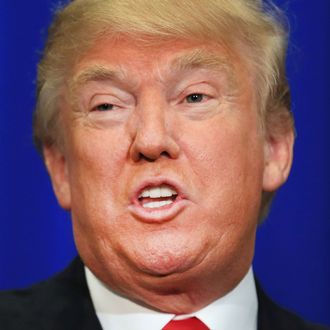
It’s pretty well known that there hasn’t been a “contested convention” since 1976, or a multi-ballot convention since 1952. With a lot of Republicans this year plotting both, it’s probably a good time to take a look at a related phenomenon: past efforts to deny a putative, all-but-official nominee the prize nearly within his grasp.
In the modern era (i.e., when nominations have been largely determined in advance in the states rather than at the convention by a handful of bosses), there have been quite a few Stop Somebody campaigns.
Republicans 1964: Prior to Goldwater’s nomination, party leaders rightly feared that he might prove to be a general-election disaster. After Nelson Rockefeller and Henry Cabot Lodge fell in the primaries and George Romney and Richard Nixon chose not to run, GOPers tried to engineer a favorite-son blocking effort behind Republican governors. It didn’t work, and Establishment stalking horse William Scranton of Pennsylvania was the last governor standing, until he was crushed by Goldwater at the convention.
Republicans 1968: Richard Nixon was just short of a delegate majority heading into the convention that stormy year, and, in a fascinating pincer movement, Nelson Rockefeller (who initially chose not to run but then changed his mind in the late primaries) and Ronald Reagan (who announced on the eve of the convention) tried to stop his second nomination. Nixon thwarted Rockefeller’s electability argument via a poll showing him as stronger than Rocky against Hubert Humphrey, and headed off Reagan by making a lot of fateful promises to Southern conservatives.
Democrats 1968: Speaking of Hubert Humphrey, the then-vice-president won the 1968 presidential nomination without winning a single primary (he delayed his formal announcement of candidacy until most of the filing deadlines were safely out of the way), having inherited a huge party-Establishment following from Lyndon Johnson. Robert Kennedy’s assassination largely removed any doubt about Humphrey’s ultimate victory, but antiwar delegates staged a platform fight at the Chicago convention amid violence outside, and even within, the hall, hoping either to upset Humphrey’s nomination or force an uncongenial platform on him. It didn’t work.
Democrats 1972: After George McGovern all but clinched the nomination with a victory in winner-take-all California, his vanquished rivals (Humphrey, Ed Muskie, Scoop Jackson, and even Shirley Chisholm — all but George Wallace, who was recuperating from an attempted assassination) joined forces in what was called an ABM (Anybody But McGovern) coalition. Their attempted coup at the convention revolved around a motion to force proportional allocation of California’s delegates, which would have left McGovern just short of a majority. The motion failed.
Republicans 1976: The Ford-Reagan fight in 1976 was less a rearguard action against a putative nominee than it was an incredibly close contest that wasn’t resolved until the convention. But Reagan’s tactic is worth remembering: a pre-convention announcement that his running mate would be liberal Republican Sen. Richard Schweiker. The gambit did pry loose a few Pennsylvania delegates for Reagan, but he probably lost more — and his last chance at that year’s nomination — in Mississippi, where outrage about Schweiker was high.
Democrats 1976: Jimmy Carter ran a blitzkrieg through the early primaries in 1976, eliminating several rivals, including George Wallace and Scoop Jackson. Even as Mo Udall fell short in a later challenge to Carter, a last-minute ABC (Anybody But Carter) cabal was formed whereby Frank Church and Jerry Brown divided up primaries and succeeded in beating the putative nominee in Nebraska and Oregon (Church) and Maryland (Brown). It was too little, too late.
Democrats 1980: Jimmy Carter beat back Ted Kennedy’s primary challenge in 1980 pretty effectively until Kennedy suddenly won a string of late primaries. As Carter’s approval ratings and general-election prospects began to sag, another ABC movement formed, this time under the banner of an “open convention” in which pledged delegates would be given the freedom to choose. A convention resolution to this effect failed. Carter’s more liberal opponents did, however, secure a variety of platform concessions; like many putative nominees in some danger, he chose to take a dive on the platform rather than risking a “test” vote that could go the wrong way.
Democrats 1984: While less dramatic than the prior revolts, 1984 did involve another late winning-streak by an apparently defeated candidate, this time Gary Hart. What made ‘84 significant is that Democratic superdelegates, appointed for the first time that year, were in a position to seal the nomination for Fritz Mondale.
As you can see, several of these precedents directly anticipate what we are hearing from anti-Trump cabalists today: calls for an “open convention”; efforts to arrange divide-the-states strategies to combine resources against the front-runner; suggestions that late primaries matter most; and pleas to turn aside primary voter preferences in the pursuit of electability. As the Goldwater and McGovern examples illustrate, these revolts haven’t worked, but have made things worse for the nominee.






























